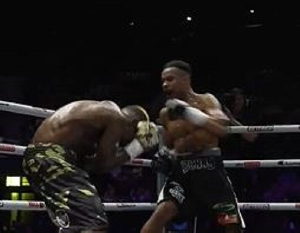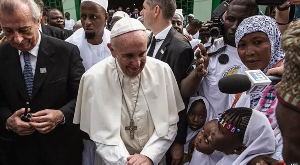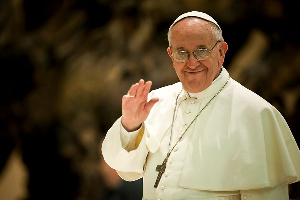It is a six-storied apartment complex. Folk consensus had it that it is The Country, so-called. Uncle Kweku Bonsam occupies the sixth floor, Aunt Kweku Bonsam the first floor. An anonymous straggle of characters takes up the intervening floors. And as is always the case, Uncle Kweku Bonsam duly pays Aunt Kweku Bonsam one of his many clandestine conjugal visits.
When? Today. Conjugal visit? Really? Somehow. Not really! What is it then? Surely we shall come back to this question again as it is left hanging in the emotional cobweb of The People’s jaded imagination.
Uncle Kweku Bonsam and Aunt Kweku Bonsam have a gorgeous daughter between them. She answers to the name Akua Bonsam. But she is not merely a daughter as everyone else thinks but a son as well, a not-so-conscientious one at that. Akua Bonsam is an intersexual mystery, a male shadow clothed in the moral fiber of feminism, who suffers from a paralysis of the limbs, of the eyes, of the mind, the collective conscious. Of the eyes? Yes. Blindness. Akua Bonsam was born out of a fractious relationship of syphilitic poetry and chlamydial journalism and gonorrheic novelism. And although, she is indisputably actively motile and forever seems to be on the move developmentally and culturally and economically, she is glued to a fantastic fate of perpetual immobility. Her unapologetically pathetic situation, however, is indistinguishable from the Cartesian spatiality of existential actualities, which any true lover of political mathematics should of course want to associate with the point-set topology of circles.
That is the state of political affairs. It seems. Thus, moving endlessly in hazy circles is as problematically confusing as running back and forth on a misty treadmill of linear paths of political indecision, for prescience, a cultivated virtue by many a great man and woman, is not a functional locationality of ideational simplicity as exemplified by emotional circularity and sentimental linearity. Akua Bonsam, a mere six-year-old automaton, is deep asleep breathing heavily at the hour of her father Uncle Kweku Bonsam’s stealthy arrival in Aunt Kweku Bonsam’s neurotic one-bedroom apartment. Aunt Kweku Bonsam’s alert eyes quickly throws up a ray of fast-moving suspicion through slits of flooding light at a stranger fully attired in a mystery of forlorn darkness. She inches closest to the mystery of forlorn nightlines. “Who is it?” says she.
“It is I!” says he in a muffled tone, a playful act typical of a character on the verge of giving birth to a sensual bubble of childish mischief.
Immediately Aunt Kweku Bonsam auditorially catches up with the familiar voice of erotic presence. She gives the starving door a romantic nudge, letting him in on tiptoe. Before long, emotional shadows of hushed tones from scenes of conversational foreplay dissolve into assorted physical entanglements of aphrodisiac oneness on Aunt Kweku Bonsam’s lousy lone couch, each passionately fondling the other for the sensual whereabouts of his or her lost soul. Akua Bonsam’s visual tentacles are wide awake, piercing through the emotional concrete of nightly romance.
In no time running-beads of ghostly moans and groans of pretense slowly arrive at the doorstep of her argus-eyed ears. Akua Bonsam is jolted out of her deathlike sleep into an elderly world of sinful wakefulness. She sits up hesitantly, staring straight ahead into the fast-approaching distance. Her perceived blindness cuts through another thick fog of sheepish sleepiness, ultimately settling her focused attention on her parents’ sinusoidal lockstep of erotic rhythmicity. Her visual fixture on her parents’ sinful political nature goes on uninterruptedly for about six minutes or so. It does not take too long, however, before the sweltering sun of her cold stare gnaws into the rigid distance of telepathic conscience separating her from her mother, ultimately melting the distance into outwardly radiating smokescreens behind which lie buried layers of ignoble pretentions deriving from her parents’ political prostitution. The aura of Aunt Kweku Bonsam’s guilty conscience wakes up to Akua Bonsam’s righteous anger. “Mother, what do you think you are doing?” asks the latter.
That spontaneous question from God’s voice! The smiling sun of existential reality sets in nonetheless, instantaneously ceasing its rotatory progression around the earth of wickedness, paralyzing the romance of nightly confidence.
Could the Joshua of political augury be lying? Apparently not! Aunt Kweku Bonsam vaguely feigns ignorance of the question, perceiving it as too prejudicial. On the contrary, the sinusoidal rhythmicity of Uncle Kweku’s Bonsam’s dancing-loin freezes up momentarily, getting caught up in a static of conscious time. Neither voices out a word, instead breaking out in a cold sweat concurrently. The two had suddenly resolved into mummified ghosts at this crucial moment in time. Yet silence cannot be an option, remaining, as it does, outside the managed portfolio of tactical responses to the crisis of political inaction. They know, as Akua Bonsam herself knows, that she is not naïve when it comes to knowledge of adult erotic exuberance, of political exhibitionism. At six?
“What do you think you both are doing?” repeats the little girl.
Uncle Kweku Bonsam, a bi-ethnic character, Akyem and Asante mainly, and Aunt Kweku Bonsam, a multiethnic conglomerate, have made it a point not to cooperate in the interest of The Country’s development for reasons of partisan elitism and general dislike of The People. Other reasons are at play as well. The element of binary opposition, the autocratic air of intra-party bi-ethnicity intrinsic to Uncle Kweku Bonsam’s partisan personality, has consistently failed to bring the political aroma of robust unitary coherence upon his public conduct as far as the social mechanics of multiparty democracy goes. Greed, intellectual elitism, ethnic exceptionalism, and emotional pedantry are their métiers, their strong suits. Uncle Kweku Bonsam’s bi-ethnic personality publicly preaches egalitarian capitalism, an Orwellian phrase of enormous internal contradictions, but privately it is a stout apologist of capitalist terrorism. And it also is an expert thief and a professional kleptomaniac.
Alternatively though, the ethnic diversity of Aunt Kweku Bonsam’s national character enjoys popular reception among the anonymous tenants of The Country, which is to say, the multiethnic complexity of The Country somewhat reflects the totalized phenotypic fabric of the anonymous tenants of The Country, The People, Akua Bonsam. But there is an unspoken weightiness hanging on Aunt Kweku Bonsam’s streaky conscience. Nevertheless, unlike Uncle Kweku Bonsam’s capitalist terrorism, Aunt Kweku Bonsam affirmatively professes social democracy in the public domain. Yet she has done everything within her power to reverse all the gains of social democracy by betraying its noble tenets of egalitarianism. But Aunt Kweku Bonsam, known for her strong public empathy with the tenants’ abject living conditions, has thrown caution to the wind by doling out Judgment Deaths to a scatterplot of undeserving individuals yoked to her partisan ribcages as well to Uncle Kweku Bonsam’s, both representing the leading political parties in The Country.
The so-called Judgment Deaths, a portfolio of generational curses from the NPP, are political death certificates served on The Country’s ailing economy which the NDC’s poor mismanagement formula, its trademark modus operandi, has occasioned. Akua Bonsam’s glare remains in focus. Meanwhile, Aunt Kweku Bonsam and Uncle Kweku Bonsam finally collect their thoughts after having decoupled themselves from a passing ordeal of political captivus. Gradually they return Akua Bonsam’s steady glare, while she directs her shy paralytic eyes away from their culpable visual conscience. There are harrumphs from the two adults. “We are doing nothing; we are merely under the influence of the superposition principle…,” Aunt Kweku Bonsam and Uncle Kweku Bonsam whisper in unison in response to their child’s standing question. Unasked, however, Uncle Kweku Bonsam goes on to explain “superposition principle,” ascribing a child’s primordial essence to his or her parents’ paired essences, with half of each pooled paired essences coming from each parent.
That is not different from asserting a direct correlation between a child’s social genotype and the social genotype of his or her parents’ environmental make-up. Or that the behavior of a politician is an implicit functional property of the universal character of the masses from whom the former springs. Could that be why Akua Bonsam is a political hermaphrodite? Well, political commentators from Floor 2 through Floor 5 have coined the politically incorrect term “hermaphrodite” to capture Akua Bonsam’s pooled pairs of political allelic essences, yet again, half of each paired alleles attributed to parent. It means, in effect, that the intrinsic character of both major political parties is implicit in Akua Bonsam’s social-political characterology. In a way the “superposition principle” concept holds promise for multiethnic integration where hostile differences coalesce into an atmospheric harmony of social-political existence. While some are quick to uphold xenophobia and ethnic nationalism as welcoming responses to inter-ethnic hostilities, others, such as Akua Bonsam, are of the view that a healthy compromise, represented by the “superposition principle,” is the way forward, where the proposition takes into consideration the commonality of man’s genetic infrastructure.
Why the superficiality of ethnic and racial phenotypes creates antagonism amongst man is itself an age-long speculation of no small consequence. Indeed diversity is the hallmark of aesthetics. The diversity in poetry, prose, and literature; the diversity in music, for instance, salsa, highlife, classical, rap, jazz, reggae, Afrobeat, etc; the diversity in the plant world; the diversity in languages; the diversity in the texture of human hair and complexion and cultures…underscore the creative mastery and evolutionary potentiality of nature, though, unfortunately, man’s self-serving reinterpretation of the aesthetic concept of diversity has provoked more problems for him than the world, ancient and modern, could possibly bring itself to keep track of. Diversity in human and race relations has fed mutual suspicions among men, created conflicts, disunity, racism, ethnocentrism, religious wars, hostile contradictions, and so on.
However, the failure of man to appreciate the aesthetic mystery of diversity is not enough grounds for worry or rejection of the normative. As a matter of fact, we do know, for instance, that discourse on diversity in sex positions, matters of spirituality, pleasure, desire, and material wealth, a congregation of ideas which the ancient authors of Karma Sutra elaborately explored in the cultural autochthony of Indian romance, implicitly underwrite relational bliss across the unifying psychosociology of romance. Thus, tying two lovers in a Siamese knot of romantic bliss is worthy of emulation by disparate races, ethnicities, or ideologues!
Given these contexts, we may ascribe the phrase “unity in diversity” to the existential sociology of multiethnic oneness where, all other things being equal, the “superposition principle” holds the dialectic foci of national discourse on multiethnic corporation, rhythmic synthesis of model human qualities squeezed out of the juicy diversity of ethnic consciousness, and harmony of human interconnectedness together. Thus, the social haplotype of multiethnic concord should be seen by all as a perquisite for the success of national confederation. But the entire conceptual framework of political “hermaphrodite” seems to leverage itself exclusively against the political economy of sexual imperialism, Akua Bonsam’s unshakeable position, though her parents uniformly think otherwise. They see the same phenomenon as democratic imperialism instead. Fundamentally, Akua Bonsam, on the other hand, sees The Country’s brand of “democratic imperialism” as a political exemplar of “the imperialism of sexual promiscuity,” a dreadful state of affairs in which Aunt Kweku Bonsam and Uncle Kweku Bonsam, her scheming parents, battle each other over which of the two is in a better position to sell off The Country to Insanity Means Freedom (IMF).
Who is the IMF? The IMF has been secretly engaged in a string of amorous affairs with both of Akua Bonsam’s parents, Uncle Kweku Bonsam and Aunt Kweku Bonsam. The IMF, a bisexual shylock, is severally betrothed to Akua Bonsam’s parents through a political marriage of convenience, one based exclusively on a tenacious partnership of sexual imperialism, in which, predictably, only Aunt Kweku Bonsam and Uncle Kweku Bonsam always appear incommensurably to contract the social-economic bug of chlamydial, gonorrheic, and syphilitic agony, after the IMF has completely emptied its decisional microbes into Akua Bonsam’s economically mismanaged womb. Unfortunately this political activity of epidemiological romance is given full political actuation by The Country’s constitutional dictatorship. For one thing the praxis of democratization as seen in The Country takes a close, familiar likeness to the profligacy of the Prodigal Son, where the former’s vast national wealth is largely shared between The Country’s political elite and Western multinationals.
That admission does not leave matters there. There are many contentious layers to the political personality of constitutional dictatorship as practiced by Uncle Kweku Bonsam and Aunt Kweku Bonsam, nonetheless. The political dispensations of both have failed to witness rigorous implementation of progressive ideas conducive to the material actualization of responsible democracy. Both have also failed on a number of practical issues such as clearly defining a common national destiny for The Country’s development, given that responsible democracy works best, at least in theory, when strong and independent judiciaries, export-oriented and industrial economies, responsible media, well-informed citizenry, official transparency and probity and accountability, improved public sanitation and public health, rigid separation between state and religion, strong and independent national security apparatuses, and equitable distribution of ethnic-blind policies exist in the body politic. It is said a malignant cancer on the toe, for instance, sends turbulent waves of homeostatic disturbances to the rest of the body.
It is a shame both parties do not see partisan dereliction of due process and The Country’s excessive reliance on foreign aid as cogs in the political wheel of developmental mobility. What does this shady marriage entail? In the main others confidently say the IMF is legally married to the gigolo Aunt Kweku Bonsam and to the nymphomaniac prostitute Uncle Kweku Bonsam. This unhealthy, dangerous relationship between arbitrary combinations of any two of the three, however, is precisely what political commentators call “captivus,” mentioned previously, meaning the “tie” a male dog and a female dog experience in the titillating heat of carnal knowledge. It is also a matter of ancient history that the IMF is an institutional chameleon, that he or she is neither day nor night, or anything between.
And it also is quite fascinating to acknowledge Akua Bonsam as the only one in the fold who habitually bears the disproportionate burden of her parents’ wanton political sluttishness with the IMF’s political sexual foreignness. Aside from that, widespread political corruption based on the gonorrheic, chlamydial, and syphilitic hypocrisy on the part of Uncle Kweku Bonsam and Aunt Kweku Bonsam now threatens to destroy the edificial tomorrow of youthful wizardry. What are The People to do? What is Akua Bonsam to do? What is the anonymous suite of tenants to do? Yet they all continue to ignore issues of national importance, environmental pollution from galamsey, say, while dabbling in useless questions as to which ethnicity should be made to bear the hegemonic brunt of ethnic nationalism.
Emerging diseases creep via the airy cracks of inter-ethnic hostilities while the solid edifice of ethnocentrism and ethno-political bickering takes form in public consciousness. Ebola virus literaryism is the latest addition to the national portfolio of emerging diseases. Still, Akua Bonsam’s colonial and post-colonial question: “What do you both think you are doing?” hangs unsociallly in the vapid air of political elitism. What is more, Akua Bonsam’s question is important for a number of reasons, one of which borders on the lightning speed at which the political corruption of gonorrheic, syphilitic, and chlamydial hypocrisy pushes its way through the rigid cell wall of public morality. Indeed, the fierce irradiation of moral panic in The Country due to rampant public corruption does not even incur the righteous ire of public officials, Uncle Kweku Bonsam and Aunt Kweku Bonsam. Besides, implementation of appropriate secular laws and institutional pulpitry to inoculate public conscience against invasive raunchy temptations of public corruption has both failed to make lasting impact, if any at all.
“Mother, are you going to make another baby?” asks Akua Bonsam. What a travesty of morality! The precocious six-year-old knows her mother Aunt Kweku Bonsam is a baby factory designed by the sinister hand of nature to churn out men and women with incorrigible, corruptible minds. And she is also emotionally in the know as to the exact nature of physical, romantic, and physiological choreography required to give rise to political childbirths of moral illegitimacy, a precursor of public angst! Why is Akua Bonsam tempted with the corrupting aroma of political pedophilia, of which she is vigorously dead set against, at that tender age of moral innocence every so often by political adults supposed to know better? Why do her parents continually subject to the moral corruption of political voyeurism against her will? Yet there are enough reasons to suggest that the moral corruption of political voyeurism, which has eaten so deep into the social fabric, as it were beyond remediation, is a celebrated fixture of public consciousness.
But the moral corruption of political voyeurism has been going on ever since the little girl’s birth. What has since happened to her parents’ moral sense of shame? Apparently nowhere to be found. Loss of the so-called moral sense of shame had been dished an affective bowl of sumptuous farewell by The Country’s constitutional dictatorship, possibly on the eve of neocolonialism. Akua Bonsam calls constitutional dictatorship by its proper nomenclature, winner-takes-all. Under this system of governance the voice of opposition is largely stifled, rendered powerless and irreverent. That dampened voice is frequently lost in the elitist cacophony of partisan incumbency. Nonetheless, this autocratic system of political expression shares a theoretic overlap with Akua Bonsam’s version of sexual imperialism, an overt trait that identifies with the political praxis of male chauvinism. It is disheartening to note that the crushing tyranny of the winner-takes-all syndrome is a matter that has romantically engaged Akua Bonsam’s intellectual curiosity for quite some time now, though it is a lumbering preoccupation whose facial potential eradication The Country’s constitutional dictatorship appears sexually impotent.
This blatant political dilemma is further worsened by another troubling prospect, which is none other the pervasive corruptibility of political ménage-a-trios entangling Akua Bonsam and her amoral parents, the latter known for their Orwellian duplicity and Machiavellian political consciousness. Who really are her parents? Uncle Kweku Bonsam is the Nation of Poisonous People (NPP); Aunt Kweku Bonsam the Nation of Decent Conmen (NDC). The NPP loves to make bold mock appearances in public spaces draped in laminate masks of affability and innocent-looking wizened faces of piety, yet buried behind the masks and faces are a long history of terrorism, an archeology of NPP’s ancestral role in national destabilization activities in active collaboration with evil external forces, and a set theory of continuous elitist rejection of the masses whom it sees as anti-intellectual and unintellectual. The chameleonic characterology of the NPP is also what Peter Tosh refers to as “Brand New Second Hand.” He sings: “You think it’s the dress you wear; that make you a lady; get out of your mind; you must be crazy;…not everything you see glitter is gold…”
Vigorous pursuit of material bliss and religious glorification of corruption are Aunt Kweku Bonsam’s and Uncle Kweku Bonsam’s political genotype, more so given their easy attraction to the intellectual perfume of cultural xenophilia, willfully overlooking legitimate claims of populist attention directed toward innovative local solutions to The Country’s manifold problems. Who is more qualified to heal the gaping wounds of The Country’s problems? Between Uncle Kweku Bonsam and Aunt Kweku Bonsam, who should Akua Bonsam choose? What is the obvious choice between the poison of the Nation of Poisonous People and the conmen of the Nation of Decent Conmen? Who is the lesser evil of the two, Uncle Kweku Bonsam or Aunt Kweku Bonsam? Akua Bonsam recalls a strange dream she had many years ago prior to her birth. What happened in that dream? Let us see. In that dream she lands in the middle of an unwelcoming thick, dark forest very thirsty, appearing before a giant tree. Then, under the colorful blanket of intimidating darkness, the giant tree extends her a welcoming cup of iced-water, which she accepts grudgingly, even unenthusiastically.
How? She accepts the friendly cup under a trembling experience of forced exertion, tipping it against her noncommittal lips. Akua Bonsam dies instantly. Apparently the giant tree in question is, undeniably, a corporeal conflation of Uncle Kweku Bonsam and Aunt Kweku Bonsam. Then, which part of the tree prepared the potion, and which part the hand that delivered it? The first answer is the NPP, the second the NDC. But in life is death. The shock of her death spreads through the forest of public consciousness, giving her a heavy shove out of her reverie. She lands on Floor 3 in profuse sweat. Floor 3, an epitome of The Country’s partisan yet neutral politics, serves as the ideological home of the Conscientious Patriotic People (CPP). The CPP is the Good Shepherd sent by the wise ancestors to bail Akua Bonsam out of the chokehold of poisoned death. This is why she thinks she is forever beholden to the CPP. This is also why she thinks the political praxis of multiparty democracy is probably a self-imposed ineffaceable curse on The Country. These reservations constitute a powerful indictment of democratic imperialism, which serves simultaneously as overt critique of transcendental elitism and as covert critique of the ontology of free will, points she otherwise believes punctuates the phenomenological dilemma of man’s relationship with himself and with his environment of otherism.
Correspondingly, Akua Bonsam has preferred the cognitive monotony of robots to the clueless, motile hegemony of the leadership of The Country, even as the new leadership of the NPP take democratic dictatorship to mean ethnocracy, arrogance, intra-party terrorism and intimidation, ethnic supremacy, elitist clash of personalities, and misplaced academic elitism. Still, neither Aunt Kweku Bonsam nor Uncle Kweku Bonsam seems to care very much about strengthening the private sector, vigorously fighting corruption, revolutionizing the public mind via radical educational reforms, raising Akua Bonsam’s political consciousness beyond the emotional claims of ethnocentric parochiality, enforcing constitutional protection of the handicapped and women and children, and expanding citizenry’s scientific and technological knowledge base. Setting our reservations aside, there are more, we believe, to what The Country can do to bail itself out of the dilemma of political cluelessness. Would it not have been better, at least in principle, if the constitution of The Country’s parliamentary oversight committees have included diverse interest groups in addition to the partisan representation of Uncle Kweku Bonsam and Aunt Kweku Bonsam?
Democratic imperialism and its abject failure in the modernizing age of political consciousness! How could it be? Some say the intellectual laziness and improvidence of the opposition and the strategic, good thinking of The People forced it on Kwame Nkrumah who in turn implemented it through constitutional affirmation. And it worked so well. That is a lie. Kwame Nkrumah was never an imperialist, never subscribed to “the imperialism of male chauvinism,” much less offer unstinting support for democratic imperialism. On the other hand, the British monarchy was and still is. Public criticism of democratic dictatorship is urgently required at this crucial point in the political lives of The People, but it should be directed appropriately to its originating source, human greed! This is important for one good reason. It is the case that the conspicuous disconnect between The Country’s abundant wealth and rich human resource on the one hand and mass poverty on the other hand erodes any sense of critical comprehension of the human intellect.
In addition, it is emotionally and intellectually painful to see The Country’s parliamentary and presidential politics guarantee men and women ready ascent to the seat of material greed, leading to easy avenues of personal and familial aggrandizement. The Country’s parliament and office of the presidency, whether Aunt Kweku Bonsam’s or Uncle Kweku Bonsam’s, are the new slave markets, not dissimilar to the Salaga Slave Market, where callous, nymphomaniac politicians sell The People’s dreams on the cheap to external enemies of The Country, to themselves, and to their close associates. Aunt Kweku Bonsam and Uncle Kweku Bonsam love to sing to The People, Akua Bonsam: “Them belly full; but we are hungry;…forget your troubles and dance; forget your sorrow and dance; forget your sickness and dance; forget your weakness and dance;…cost of living gets so high; rich and poor they start to cry; now the weak must get strong…”
The People ask: Does poor Akua Bonsam have a legitimate complaint against her rich political parents if they themselves share her pessimism?
We shall return…
Opinions of Sunday, 31 August 2014
Columnist: Kwarteng, Francis














